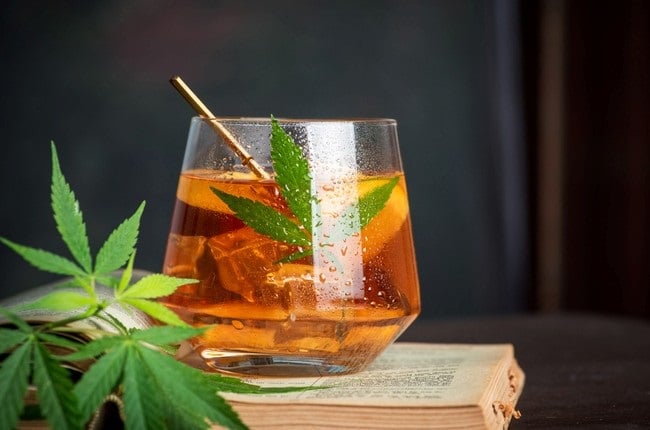
- Cannabis-infused products have been popular and widely sold for the past several years.
- But THC-infused beverages, which can cause that "high" feeling, appear to be what consumers want - and are legally sold in some parts of the world.
- They are often marketed as healthier alternatives to alcohol but can be problematic.
Marijuana: You can smoke it, eat it and even use it in your bath or skincare routine. But to consumers, this may not be enough as they are now also looking to drink it.
In March 2019, Business Insider reported the South African dagga industry could be worth R27 billion by 2023. Included in this range are CBD-infused sparkling and energy drinks that are becoming sought-after.
Last year, comedian Ellen DeGeneres told Jimmy Kimmel about her experience of consuming three "weed drinks" right before she had to rush her wife, Portia de Rossi, to the hospital for her emergency surgery, as per E! Online.
READ MORE | 8 South African dagga-inspired products we never knew existed - including bath bombs, ice cream and beer
But here's the thing: the beverage Ellen drank contained a low dose of CBD (cannabidiol), a non-psychoactive cannabinoid found in marijuana. In other words, it doesn't get you high. These drinks have been sold for many years, including in SA.
On the other hand, weed drinks that are made with THC (tetrahydrocannabinol) - the psychoactive compound in marijuana that causes the "high" - is what people seem to be willing to try, reports the New York Times.
CBS News also notes drink makers are betting consumers who don't want to smoke weed or drink alcohol, for whatever reason, can find an alternative in the drinks made with THC.
READ MORE | Japan's new campaign encourages young people to drink more alcohol - but the reaction has been mixed
"The idea of increased availability of non-alcoholic drinks is good - people need alternatives to alcoholic beverages which we know are misused by many drinkers in South Africa which is ranked as the sixth-highest country globally by the World Health Organisation in terms of the average amount of alcohol consumed per drinker per day," Professor Charles Parry, the director of the Alcohol, Tobacco and Other Drug Research Unit at the SA Medical Research Council, tells News24.
However, Parry goes on to say: "The main question for me regarding THC-infused drinks is what would be the concentration of THC in the drink? Is it a miniscule amount but it would be sold as a THC-infused drink as a marketing gimmick, or would the concentration be enough to result in an intoxicating effect?"
He adds:The Times reports Rebel Coast, a California-based winemaker, sells alcohol-free sparkling wine infused with 10 milligrams of THC.
Pabst Blue Ribbon, an American lager beer, has also introduced a line-up of non-alcoholic "High Seltzers", with each 350ml can containing 10 milligrams of THC.
According to the company, it is "the right amount to have a good time".
Recreational marijuana is legalised in numerous countries globally, including SA, Canada, Malta, Mexico, Thailand, Uruguay and 19 states in the US.
But THC in cannabis, which is different from CBD, is not legal in SA (apart from private use), and it cannot be sold in products commercially, explains Parry.Marketed as healthier alternative
As the Times explains, cannabis-infused mocktails and alcohol-free wines, among other CBD-infused drinks, are hitting the market, and are often sold as "a shortcut to a healthier high".
A recent US survey revealed out of 2 000 adults, 10% of respondents had tried a THC-infused drink.
One expert told the publication she expects that number to grow, partially because marijuana is marketed as a form of self-care and consumers associate the drug with nature.
Parry says the health benefits have been "largely overstated".
He adds: "While there may be data coming out regarding possible health benefits of THC, as far as I am aware, the data is strongest for treating chronic pain and spasticity resulting from MS."
But as is the case with all drugs, any benefits need to be weighed against its potential harms, Parry says.
Possibly drinking too much
Worryingly, the majority of casual consumers may struggle or take no interest in interpreting the numbers listed on the labels of THC-infused beverages.
"If you tell someone, this is an 8% beer, they say, 'That's a strong beer'," Dr James MacKillop, the director of the Michael G. DeGroote Center for Medicinal Cannabis Research at McMaster University, told the Times. "If you tell someone this is a 20-milligram drink versus a five-milligram drink, that's Greek to many people.
READ MORE | Marijuana could be an option for migraine relief – but more studies are needed
Someone who reaches for one too many of these drinks in a short span of time could end up experiencing serious symptoms, such as anxiety, paranoia, psychosis, vomiting, increases in heart rate and blood pressure, and in some cases, hallucinations.
While drinks infused with THC are still in its infancy and limited to a few countries, it's a concerning trend that could expand fast, should it continue to become legal in parts of the world.
"[It] is not to say that THC-infused non-alcoholic drinks with an appropriate level of THC, probably under 10mg, couldn't have health or other benefits," says Parry. "My view is that we just don't know enough yet: the research is simply not available, especially regarding different amounts of THC.
"Producers are likely to overstate the benefits, but let's see what the research from countries like Canada and certain states in the US says… [It] would be good to learn from these natural experiments plus from any laboratory studies that are carried out."



 Publications
Publications
 Partners
Partners












